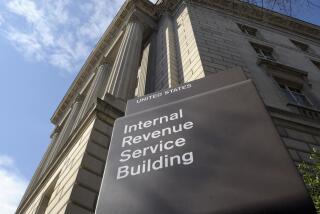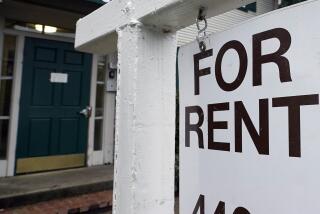Panel Supports Cut in Mortgage Deduction
WASHINGTON — President Bush’s tax reform commission tentatively agreed Tuesday to recommend a substantial reduction in the limit on mortgage interest that homeowners can deduct from their taxes.
If a uniform nationwide cap was chosen to replace the current $1-million limit on mortgage debt eligible for deduction, it could be widely felt in California, which has some of the nation’s highest home prices.
But to account for the wide disparity in home values nationally, the panel considered recommending a ceiling based on local housing prices but left the issue open, to be decided later. Some panel members suggested basing the limit on the Federal Housing Administration’s maximum on mortgages it will insure -- currently $312,895 in Southern California.
The panel did not discuss Tuesday whether to recommend limiting the interest deduction on home equity loans or second homes, as had been previously suggested by some panel members. The issue still could be discussed later.
The panel also tentatively recommended taxing some employer-provided health benefits and is considering recommending an expansion in the deduction for charitable contributions.
The commission, formally known as the President’s Advisory Panel on Federal Tax Reform, made no final decisions Tuesday. It plans one more meeting Oct. 18 to formalize its recommendations before submitting them to the Treasury Department by its Nov. 1 deadline. That department is to use them as the basis of a tax reform proposal to the White House.
In January, Bush made overhauling the U.S. Tax Code a top domestic priority, second only to establishing individual investment accounts as part of Social Security. He could hardly have chosen two more politically sensitive issues. Democratic opposition has blocked any change in Social Security, and no matter how much taxpayers complain about the Tax Code, those who benefit from its complexities are quick to defend them.
“The mortgage interest deduction helps foster homeownership, which results in both economic and social benefits,” said Steve O’Connor, vice president for government affairs of the Mortgage Bankers Assn.
Bush asked his tax reform panel to propose ways to make the Tax Code simpler and more conducive to economic growth. He also stipulated that its recommendations should not cost the Treasury any money.
Making that task more difficult is the panel’s determination to abolish the alternative minimum tax, a provision that was designed to prevent a handful of the wealthiest taxpayers from sheltering most of their income. Since its creation in 1969, the tax, which disallows many deductions and credits, has snared increasing numbers of middle-class taxpayers as their incomes have risen with inflation.
Eliminating the alternative minimum tax, the panel estimates, would cost the government about $1.2 trillion in revenue over 10 years. The panel offered no estimate of the revenue to be gained by scaling back the mortgage deduction, but according to the White House, abolishing it outright would fall somewhat short of $1.2 trillion.
James M. Poterba, an economist at the Massachusetts Institute of Technology and a member of the tax panel, said the mortgage interest deduction was overrated as an engine for promoting homeownership. In the United States, he said, about 66% of families own their own homes; in Canada, which has no mortgage interest deduction, the homeownership rate is 64%.
O’Connor disputed Poterba’s figures, arguing that the U.S. figure was closer to 69%. That 5-percentage-point gap over Canada, he said, represents 3.7 million additional U.S. homeowners.
At a time when the National Assn. of Realtors estimates the median home price at $268,000, the $1-million maximum on mortgages whose entire interest costs are deductible affects relatively few home buyers nationwide. The story is different in California, where the median is $569,000, according to the California Assn. of Realtors.
A lower limit “would be devastating to the homeowners of California,” said Vince Malta, president-elect of the California Realtors trade group.
He calculated that a $350,000 limit would result in a loss of $6,170 a year in deductions for a family that bought a median-priced home by putting 20% down and taking out a 5.87% mortgage -- the going rate -- to cover the rest.
As it is, he said, only the top 14% of all California families ranked by income can afford a median-priced home. “Real estate has been driving the economy,” he said, but it won’t much longer if the mortgage income deduction is curtailed.
Timothy J. Muris, a former head of the Federal Trade Commission and another reform panel member, argued that the exclusion from taxable income of employer-provided health benefits, like the mortgage interest deduction, benefited mostly the richest taxpayers.
The panel informally accepted his suggestion that a maximum of $11,000 a year -- the value of the health benefit for federal workers -- be excluded from taxable income.
The panel seemed inclined to expand the charitable deduction by letting the 65% of taxpayers who do not itemize deductions deduct a certain amount of their contributions to tax-exempt organizations anyway.
Commission members discussed adding a value-added tax to the income tax or switching the entire tax system to a national sales tax. Neither approach received much support.
More to Read
Get the L.A. Times Politics newsletter
Deeply reported insights into legislation, politics and policy from Sacramento, Washington and beyond. In your inbox three times per week.
You may occasionally receive promotional content from the Los Angeles Times.










